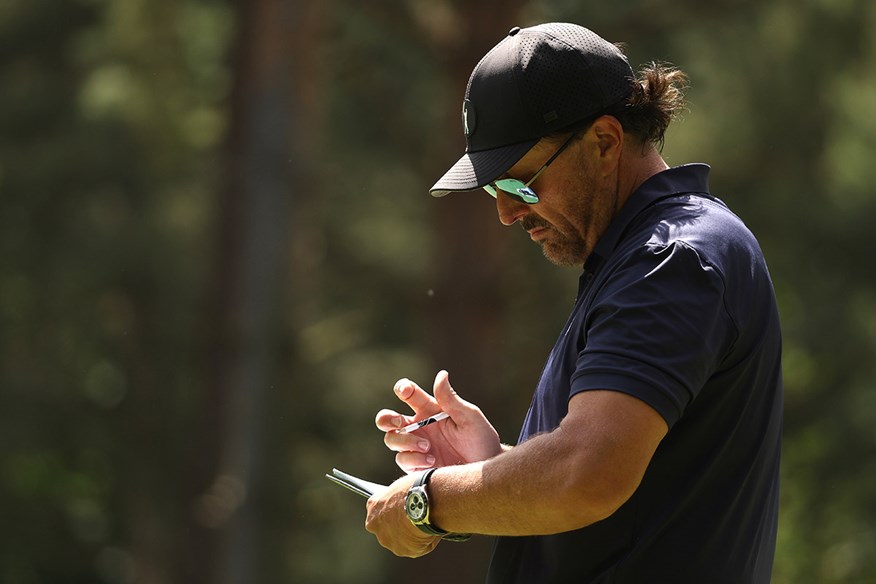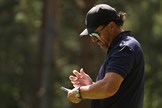Phil Mickelson’s gambling and why the PGA Tour had to intervene
Last updated:
In an excerpt from his controversial and highly anticipated biography on Phil Mickelson, author Alan Shipnuck details how Mickelson’s gambling habit got out of control and why the PGA Tour were forced to step in.
This story is adapted from “Phil: The Rip-Roaring (and Unauthorized!) Biography of Golf’s Most Colorful Superstar.
‘Phil was so invested with bets he was listening to games on the course’
A reinvigorated Tiger was not the only pall on Phil’s seemingly perfect life; his gambling issues were becoming an open secret on Tour. Steve Flesch was paired with Mickelson on a Sunday at the Hyundai Team Matches around the turn of the century. “Every hole, he was checking like a beeper or something,” says Flesch with a laugh.
“He could not have cared any less about what we were doing on the golf course. He was definitely more concerned about who was winning the football games and who was covering the spread.” Tom Lehman had a similar experience with Mickelson at the 2000 Presidents Cup, when he was paired with Mickelson for a Saturday afternoon better ball versus Mike Weir and Steve Elkington.
BUY NOW: GET ‘PHIL’ IN THE US | GET ‘PHIL’ IN THE UK
“Phil is hitting it everywhere—he’s barely finished a hole through the first eight holes,” says Lehman. “He keeps saying, ‘Don’t worry, I’ll show up eventually.’ On the ninth hole he buries it in the front bunker and is out of the hole again. He walks way back into the trees and is sitting on a stump with his back to everybody and his head down. I think he’s giving himself a pep talk, so I go over there to try to make him feel better and he’s got his phone out and he’s checking the football scores.”
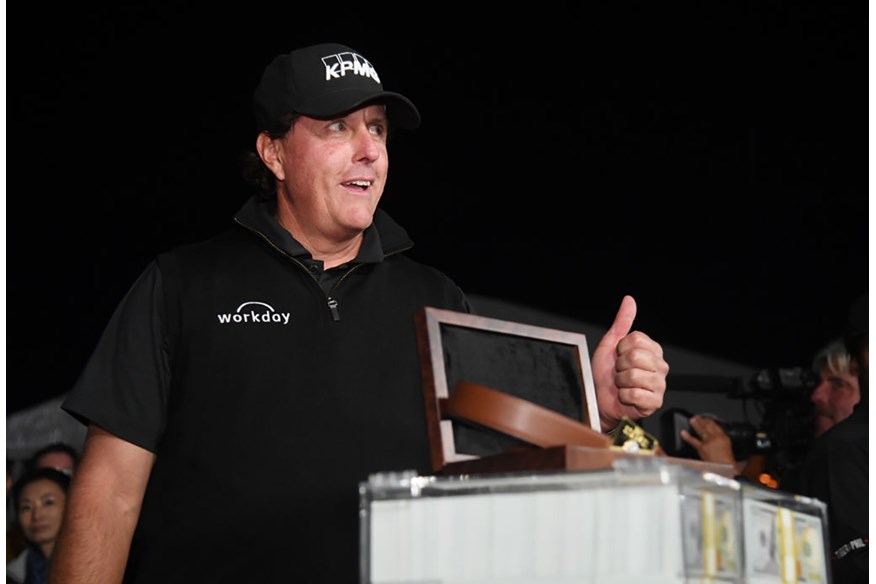
In February 2001, Mickelson’s gambling spilled into public view when he made headlines for cashing a $560,000 Super Bowl ticket, as months earlier he plunked down $20,000 on the Baltimore Ravens at 28-1. (As the Ravens wreaked havoc throughout the regular season, Mickelson let friends and family buy into the bet, spreading the wealth.)
Mickelson was so invested in the Ravens’ run that when the AFC Championship game fell on Saturday of the Tournament of Champions in Kapalua, Mickelson surreptitiously listened to the game during his round with an earpiece and a radio hidden in his clothes.
RELATED: “Mickelson never opens his mouth without an agenda.”
Later in 2001, when the Tour visited Firestone, Mickelson was lounging in the locker room watching a Woods–Jim Furyk playoff. On the first extra hole, Furyk left himself in a greenside bunker and Mickelson barked out that he would bet $20 on Furyk holing the shot, at 25-1. Mike Weir took the wager and then had to pay Mickelson $500 when Furyk did, in fact, jar it.
When Golf World reported what had happened, Mickelson earned a talking-to by PGA Tour commissioner Tim Finchem for potentially violating Section VI-B in the PGA Tour Player Handbook, which states, “A player shall not have any financial interest, either direct or indirect, in the performance or the winnings of another player.”
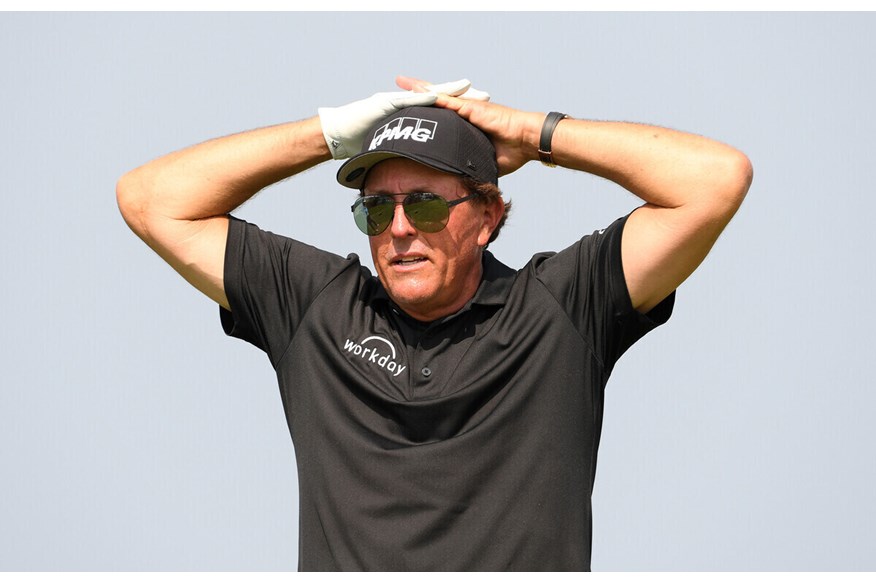
Mickelson’s need for action carried over into actual Tour events. “When I was in the tower,” says former CBS announcer Gary McCord, “every time Phil got to my hole, Bones would look up at me and I would flash the odds. If Phil had a fifteen-footer, I’d flash three fingers, which meant the odds were three-to-one. If he was sixty feet, I’d give him two-to-one on a two-putt.
Bones would go down and whisper in his ear and Phil would look up at me and shake his head yes or no. I can’t tell you how many wadded-up twenties I threw out of the tower, until the Tour found about it and I got word through CBS I was no longer allowed to gamble with Phil while up in the tower.” There was enough chatter about Mickelson’s betting that his manager began to fret about his public image.
“Steve Loy was really on Gary [McCord] and me because we affectionately called him Lefty on the [CBS telecasts],” says Peter Kostis. “He thought that Lefty was a derogatory reference to gambling and other things. He didn’t want us to call him Lefty anymore.” Ironically, this became the centerpiece of a wager when Kostis and McCord took on Mickelson in a friendly eighteen-hole match.
RELATED: Why did Phil Mickelson really join the LIV Golf tour?
“If we lost, we wouldn’t call him Lefty on the air ever again,” says Kostis. “But if we won, we could keep calling him Lefty. So in our match we had this great Mongolian reversal on the last hole where Phil hit it in the shit and Gary and I made birdie.
“We went from down eight hundred dollars to up, I don’t know, eight hundred dollars or so. And Phil is so angry that he lost that he just keeps walking once we get to the cart area. And he goes to his car and doesn’t pay. Doesn’t do anything. And as he’s getting in his car, Gary and I are going, ‘Hey, Lefty, don’t be so upset, Lefty. Come on, Lefty. You haven’t even paid us yet, Lefty.’ So we used Lefty about forty-seven times in three minutes. That was fun.” And yet the nickname vanished from the airwaves.
“Scottsdale’s a very small town,” Kostis says with a sigh. “We didn’t want to rock the boat too much. So we didn’t refer to him as Lefty anymore, regardless of the bet.”
RELATED: The 100 Most Influential People In Golf
Phil: The Rip-Roaring (and Unauthorised!) Biography of Golf’s Most Colourful Superstar
A frank and revealing biography of legendary golf champion Phil Mickelson – who has led a big, controversial life – as reported by longtime Sports Illustrated writer and bestselling author Alan Shipnuck.
BUY NOW: GET ‘PHIL’ IN THE US | GET ‘PHIL’ IN THE UK
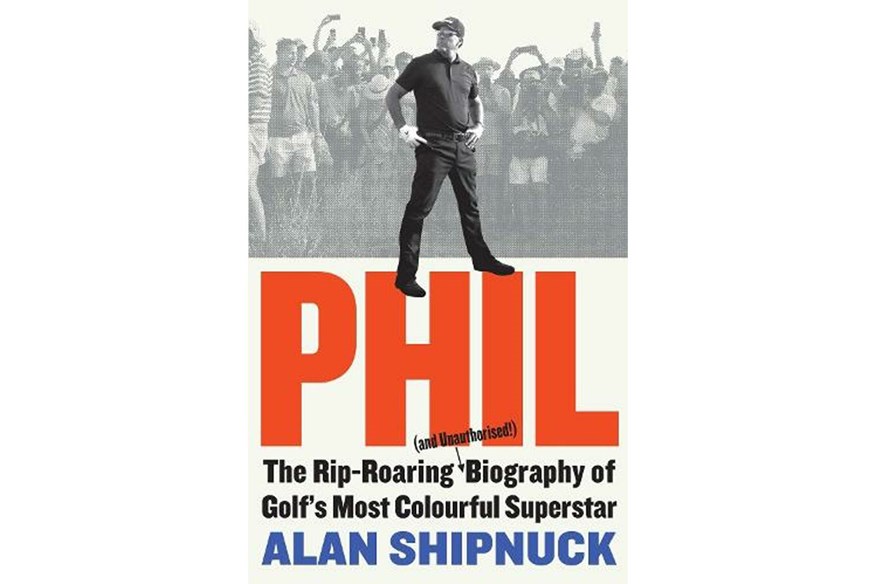
READ NEXT
– Why Phil Mickelson and Jim ‘Bones’ Mackay really split
